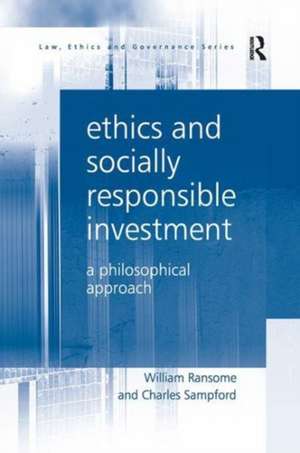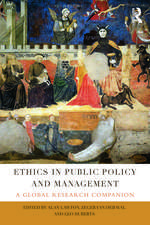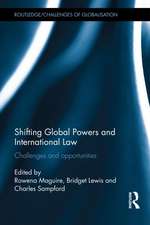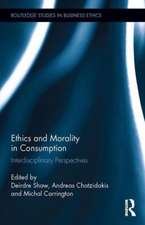Ethics and Socially Responsible Investment: A Philosophical Approach
Autor William Ransome, Charles Sampforden Limba Engleză Paperback – 11 noi 2016
| Toate formatele și edițiile | Preț | Express |
|---|---|---|
| Paperback (1) | 469.34 lei 6-8 săpt. | |
| Taylor & Francis – 11 noi 2016 | 469.34 lei 6-8 săpt. | |
| Hardback (1) | 1055.51 lei 6-8 săpt. | |
| Taylor & Francis – 22 mar 2011 | 1055.51 lei 6-8 săpt. |
Preț: 469.34 lei
Nou
Puncte Express: 704
Preț estimativ în valută:
89.81€ • 94.00$ • 74.75£
89.81€ • 94.00$ • 74.75£
Carte tipărită la comandă
Livrare economică 31 martie-14 aprilie
Preluare comenzi: 021 569.72.76
Specificații
ISBN-13: 9781138255678
ISBN-10: 113825567X
Pagini: 188
Dimensiuni: 156 x 234 x 17 mm
Greutate: 0.45 kg
Ediția:1
Editura: Taylor & Francis
Colecția Routledge
Locul publicării:Oxford, United Kingdom
ISBN-10: 113825567X
Pagini: 188
Dimensiuni: 156 x 234 x 17 mm
Greutate: 0.45 kg
Ediția:1
Editura: Taylor & Francis
Colecția Routledge
Locul publicării:Oxford, United Kingdom
Notă biografică
William Ransome, Research Fellow and Program Director for Corporate Governance and Social Responsibility at the Key Centre for Ethics, Law, Justice and Governance (Griffith University) received his PhD in Philosophy from the University of Queensland in 2004, and has wide-ranging interests in metaethics, ethical theory and applied ethics. Charles Sampford is Director of the Institute for Ethics, Governance and Law (IEGL) - a joint initiative of the United Nations University, Griffith University, Queensland University of Technology and the Australian National University. Educated at Melbourne and Oxford, he became the Foundation Dean of Law at Griffith University in 1991. In 1994, he was appointed the Foundation Director of ARC Key Centre for Ethics, Law, Justice and Governance. Since October 2004, he has been Foundation Director of IEGL, one of 23 academic elements in the United Nations University that brings together the Key Centre at Griffith University, QUT's Centre for Law and Justice and ANU's Centre for International and Public Law. At the same time he is Convenor of the ARC Governance Research Network and President of an international ethics NGO. Professor Sampford has written eighty articles and chapters in Australian and foreign journals and collections ranging through law, legal education and applied ethics and has completed nineteen books and edited collections for international publishers.
Recenzii
'This book offers an eloquent and accessible philosophic argument for SRI. The authors demonstrate the potential benefits of SRI and use the global financial crisis and climate change to illustrate the dire costs of a single value approach to investing.' Joanne B. Ciulla, University of Richmond, USA 'The meticulously marshalled philosophical arguments that have been distilled into this highly important and readable book leave us in no doubt that sustainable business is unachievable in the long term without our putting uncompromising ethical values and standards to work.' Tunku Abdul Aziz, Parliament of Malaysia and former Special Advisor to the UN Secretary-General on the establishment of the Ethics Office
Cuprins
Introduction Ethics and Socially Responsible Investment, William Ransome, Charles Sampford; Chapter 1 Socially Responsible Investment, William Ransome, Charles Sampford; Chapter 2 Non-Financial Values, William Ransome, Charles Sampford; Chapter 3 The Meaning of Ethics and Criticism of SRI, William Ransome, Charles Sampford; Chapter 4 A Philosophical Foundation for SRI, William Ransome, Charles Sampford; Chapter 5 SRI in Australia, William Ransome, Charles Sampford; Chapter 6 Engaging SRI, William Ransome, Charles Sampford; Chapter 7 Fiduciary Responsibility and the Global Growth of SRI, William Ransome, Charles Sampford; Chapter 8 Global SRI, William Ransome, Charles SampfordAppendix A, William Ransome, Charles SampfordAppendix B, William Ransome, Charles Sampford;
Descriere
This volume breaks new ground by approaching Socially Responsible Investment (SRI) as an explicitly ethical practice in financial markets. The work explains the origins and conceptual structure of SRI and links its pursuit to both its deeper philosophical foundations and the broader, multi-dimensional global movement towards greater social responsibility in global markets.


















